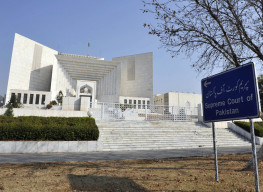
KARACHI: The Constitution of Pakistan was enacted to ensure the provision of fundamental human rights. It seems, however, that the state has decided to violate it forcefully by promulgating the Protection of Pakistan Ordinance 2013 (PPO).
This view was expressed by elected representatives, leaders of various political parties, lawyers, members of civil society organisations and journalists at a dialogue on democracy and pro-citizen legislation, organised by the Strengthening Participatory Organisation (SPO), at Mehran Hotel on Wednesday.

The speakers scrutinised the measures described in the PPO, arriving at the conclusion that the state cannot be protected by forcefully imposing new laws while crushing fundamental human rights of the citizens. They lamented that such legislation negated several articles of the Constitution as well as the universal declaration of human rights.
“Many laws have been enacted forcefully, both in democratic and dictatorship forms of government,” said former senator and politician Javed Jabbar. “The PPO is not beneficial for Pakistan and will only increase arbitrary powers of the agencies.”
Jabbar asserted that linking Pakistan’s name with the law was inappropriate, adding that the ‘beloved’ police, military and paramilitary forces should be sensitised, educated and trained for human rights. He said that the country had achieved a good level of growth in terms of state and government institutions, but unfortunately could not reach the required level of development.
SPO chief executive Naseer Memon was of the view that the PPO negated fundamental rights promised by the Constitution and the concept of protecting citizens through guns was simply not possible. “PPO will protect barbarous acts.” Memon said that Pakistan was a signatory to the universal declaration of human rights but the enhancement of law enforcers’ powers in such a way will only increase the violations of these rights. “First to sign, first to violate has become a trend.”
A representative of the Ministry of Law, Justice and Human Rights, Hassan Mangi, said that it was his ministry’s responsibility to work for the fundamental rights of the citizens. He accepted that violation had increased manifold and a culture of consultation must be promoted. In his address, Mangi spoke about almost everything - from the rights of minorities, Hindus, Christians to women and children rights. He avoided, however the topic of PPO.
Advocate Noor Naz briefed the audience about the legal aspects of the ordinance and said that the law directly violated the rights of citizens. “PPO will make people insecure instead of protecting them.”
After the PPO, Naz said that the law enforcers will be free to arrest anyone or raid any house, adding that the law enforcers will be free to kill anyone in ‘good-faith.’ “Even woman and children could be detained under PPO.”
Pakistan Tehreek-e-Insaf MPA Khurram Sher Zaman, termed the PPO a ‘black law’, adding that his party will contest it at every forum. “Fundamental rights have been crushed through this law.”
Muttahida Qaumi Movement’s Irum Azeem Farooque said that her party has already condemned the PPO and will not accept these kinds of laws. “If the violation of Article 6 is considered treason, what about the violation of the other articles of the Constitution?” She said that PPO was a ‘draconian law’ and feared it will be used against political workers.
The speakers and participants lamented that on the one hand, the government was engaging itself in dialogue with militant groups while on the other, it was making stricter laws for the law-abiding citizens.
Published in The Express Tribune, April 25th, 2014.
COMMENTS (1)
Comments are moderated and generally will be posted if they are on-topic and not abusive.
For more information, please see our Comments FAQ





























































Such Laws have been passed and accepted by superior courts of other countries (such an UK, US and Australia). Reservation about this ordinance are primarily on the basis that such powers should not be given to agencies which have the privilege of misusing their powers in many instances.